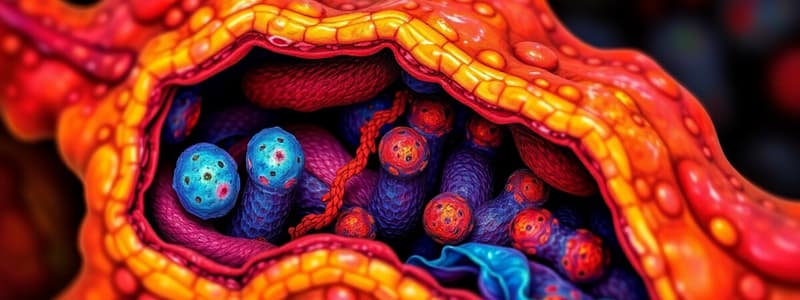Podcast
Questions and Answers
What is a key advantage of using polymeric nanomaterials in drug delivery?
What is a key advantage of using polymeric nanomaterials in drug delivery?
- They do not promote cell proliferation.
- They can be engineered to degrade at a specific rate. (correct)
- They are only applicable to biodegradable drugs.
- They are universally patentable and shielded from competition.
Which polymeric nanomaterial is noted for promoting collagen deposition in wound healing?
Which polymeric nanomaterial is noted for promoting collagen deposition in wound healing?
- Alginate Nanoparticles
- Hyaluronic Acid Nanoparticles
- Chitosan Nanoparticles (correct)
- Polycaprolactone Nanoparticles
What is the primary role of Alginate Nanoparticles in wound healing?
What is the primary role of Alginate Nanoparticles in wound healing?
- Provides excellent moisture retention to accelerate healing. (correct)
- Supports tissue engineering without moisture retention.
- Functions solely as a structural scaffold.
- Promotes high levels of inflammation during healing.
Polycaprolactone Nanoparticles are primarily used for what purpose in wound healing?
Polycaprolactone Nanoparticles are primarily used for what purpose in wound healing?
Which property of Hyaluronic Acid Nanoparticles aids in the healing process?
Which property of Hyaluronic Acid Nanoparticles aids in the healing process?
What characteristic distinguishes Poly(lactic-co-glycolic acid) Nanoparticles?
What characteristic distinguishes Poly(lactic-co-glycolic acid) Nanoparticles?
Which of the following statements about Collagen Nanoparticles is accurate?
Which of the following statements about Collagen Nanoparticles is accurate?
What role do antimicrobial properties play in Chitosan Nanoparticles?
What role do antimicrobial properties play in Chitosan Nanoparticles?
What is the primary goal of the hemostasis stage in wound healing?
What is the primary goal of the hemostasis stage in wound healing?
Which type of immune cells are primarily responsible for cleaning the wound during the inflammation stage?
Which type of immune cells are primarily responsible for cleaning the wound during the inflammation stage?
In the proliferation stage, what is the main role of fibroblasts?
In the proliferation stage, what is the main role of fibroblasts?
What is the main consequence of the remodeling stage after wound healing?
What is the main consequence of the remodeling stage after wound healing?
What can excessive inflammation during the healing process lead to?
What can excessive inflammation during the healing process lead to?
Which process occurs during the proliferation phase of wound healing?
Which process occurs during the proliferation phase of wound healing?
What role do growth factors play in wound healing?
What role do growth factors play in wound healing?
Why is remodeling important in the wound healing process?
Why is remodeling important in the wound healing process?
What is the primary role of Epidermal Growth Factor (EGF) in wound healing?
What is the primary role of Epidermal Growth Factor (EGF) in wound healing?
Which growth factor is responsible for enhancing granulation tissue formation and wound contraction?
Which growth factor is responsible for enhancing granulation tissue formation and wound contraction?
What function does Transforming Growth Factor-Beta (TGF-β) serve in wound healing?
What function does Transforming Growth Factor-Beta (TGF-β) serve in wound healing?
Which growth factor specifically supports the formation of new blood vessels?
Which growth factor specifically supports the formation of new blood vessels?
Which growth factor enhances the migration of keratinocytes and supports skin barrier restoration?
Which growth factor enhances the migration of keratinocytes and supports skin barrier restoration?
What is the main role of Insulin-like Growth Factor-1 (IGF-1) in wound healing?
What is the main role of Insulin-like Growth Factor-1 (IGF-1) in wound healing?
Which growth factor increases immune cell proliferation and activity to promote wound debridement?
Which growth factor increases immune cell proliferation and activity to promote wound debridement?
What role does Vascular Endothelial Growth Factor (VEGF) play in wound healing?
What role does Vascular Endothelial Growth Factor (VEGF) play in wound healing?
Which nanomaterial is known for its broad-spectrum antimicrobial properties and promotes wound healing?
Which nanomaterial is known for its broad-spectrum antimicrobial properties and promotes wound healing?
What is a key advantage of using Chitosan Nanoparticles in wound healing?
What is a key advantage of using Chitosan Nanoparticles in wound healing?
Which nanomaterial primarily promotes collagen synthesis during wound healing?
Which nanomaterial primarily promotes collagen synthesis during wound healing?
Which mechanism of action is associated with Gold Nanoparticles in wound healing?
Which mechanism of action is associated with Gold Nanoparticles in wound healing?
What is the primary function of Silica Nanoparticles in wound healing applications?
What is the primary function of Silica Nanoparticles in wound healing applications?
Which of the following nanomaterials is known for enhancing cellular growth?
Which of the following nanomaterials is known for enhancing cellular growth?
Which nanomaterial is effective in controlled drug delivery and anti-inflammatory actions?
Which nanomaterial is effective in controlled drug delivery and anti-inflammatory actions?
What advantage does Hydrogel Nanoparticles offer in wound healing?
What advantage does Hydrogel Nanoparticles offer in wound healing?
Which of the following nanomaterials mimics the natural extracellular matrix to enhance tissue repair?
Which of the following nanomaterials mimics the natural extracellular matrix to enhance tissue repair?
What is a primary application of hydrogel nanoparticles in wound care?
What is a primary application of hydrogel nanoparticles in wound care?
What role do Liposomes play in wound healing?
What role do Liposomes play in wound healing?
Which property of graphene oxide supports its use in tissue engineering?
Which property of graphene oxide supports its use in tissue engineering?
What advantage do liposomes provide in drug delivery for wound treatment?
What advantage do liposomes provide in drug delivery for wound treatment?
How do nanofibers enhance tissue regeneration?
How do nanofibers enhance tissue regeneration?
What role do hydrogel nanoparticles play in pain reduction during wound healing?
What role do hydrogel nanoparticles play in pain reduction during wound healing?
Which of the following is NOT an application for graphene oxide nanoparticles?
Which of the following is NOT an application for graphene oxide nanoparticles?
What is a key benefit of using electrospun nanofibers in wound dressings?
What is a key benefit of using electrospun nanofibers in wound dressings?
What mechanism allows liposomes to improve drug penetration into wounds?
What mechanism allows liposomes to improve drug penetration into wounds?
Flashcards are hidden until you start studying
Study Notes
Growth Factors in Wound Healing
- Epidermal Growth Factor (EGF) enhances re-epithelialization, accelerates wound closure, and promotes tissue regeneration.
- Transforming Growth Factor-Beta (TGF-β) controls scar tissue formation, regulates inflammation, and promotes extracellular matrix deposition.
- Platelet-Derived Growth Factor (PDGF) enhances granulation tissue formation, angiogenesis, and wound contraction.
- Vascular Endothelial Growth Factor (VEGF) supports vascularization and formation of granulation tissue.
- Fibroblast Growth Factor (FGF) stimulates fibroblast proliferation and angiogenesis, promoting granulation tissue formation.
- Insulin-like Growth Factor-1 (IGF-1) facilitates re-epithelialization and granulation tissue formation.
- Keratinocyte Growth Factor (KGF) enhances re-epithelialization and skin barrier restoration.
- Granulocyte-Macrophage Colony-Stimulating Factor promotes wound debridement and angiogenesis by enhancing immune response.
Polymeric Nanomaterials in Wound Healing
- Chitosan nanoparticles are biodegradable, biocompatible, antimicrobial, and promote cell proliferation.
- Poly(lactic-co-glycolic acid) (PLGA) nanoparticles are biodegradable, enable controlled drug release, and promote cell regeneration.
- Polycaprolactone (PCL) nanoparticles are biocompatible, slowly biodegradable, and promote cell attachment.
- Alginate nanoparticles are biocompatible, hydrophilic, and form gels, which are excellent for moisture retention.
- Collagen nanoparticles are biocompatible, promote cell adhesion and proliferation, and mimic the extracellular matrix (ECM).
- Hyaluronic Acid nanoparticles are biodegradable, hydrophilic, and promote angiogenesis and tissue hydration.
Stages of Wound Healing
- Hemostasis is the immediate response, stopping bleeding. This involves blood vessel constriction and platelet aggregation to form a clot.
- Inflammation (first few days) is the cleaning phase, involving immune cells to remove debris and pathogens.
- Proliferation (several days to weeks) is the rebuilding phase, where fibroblasts produce collagen, angiogenesis occurs, and re-epithelialization takes place.
- Remodeling (weeks to months) is the strengthening and maturing phase, involving collagen reorganization and wound contraction.
Factors Affecting Wound Healing
- Growth Factors: stimulate cell growth, proliferation, and tissue repair.
- Inflammatory Response: A balanced immune response is essential for efficient wound healing.
- Nutritional Status: Adequate protein, vitamins, and minerals are needed for collagen synthesis and cell proliferation.
- Infection: Delays healing by prolonging inflammation and tissue damage.
Applications of Nanotechnology and Biomaterials in Wound Healing
- Polymeric nanomaterials provide controlled, localized drug delivery for enhanced wound healing.
- Growth factor delivery systems accelerate tissue repair and promote faster healing.
- Bioactive wound dressings help reduce infection.
Types of Nanomaterials Used in Wound Healing
- Silver nanoparticles: antimicrobial
- Gold nanoparticles: anti-inflammatory and promote cell proliferation
- Zinc oxide nanoparticles: antibacterial and promote angiogenesis
- Chitosan nanoparticles: antimicrobial and enhance wound closure
- Silica nanoparticles: provide structural support and drug delivery
- Carbon nanotubes (CNTs): promote tissue regeneration and drug delivery
- Copper nanoparticles: antibacterial and promote collagen synthesis
- Cerium oxide nanoparticles: antioxidant and reduce oxidative stress
- Hydrogel nanoparticles: moisture retention and drug delivery
- Graphene oxide nanoparticles: antibacterial and support cell adhesion
- Nanofibers (e.g., electrospun): create wound scaffolds and support cell migration
- Liposomes: encapsulate drugs for controlled release
- Polymeric nanoparticles: drug delivery and anti-inflammatory properties
Studying That Suits You
Use AI to generate personalized quizzes and flashcards to suit your learning preferences.




